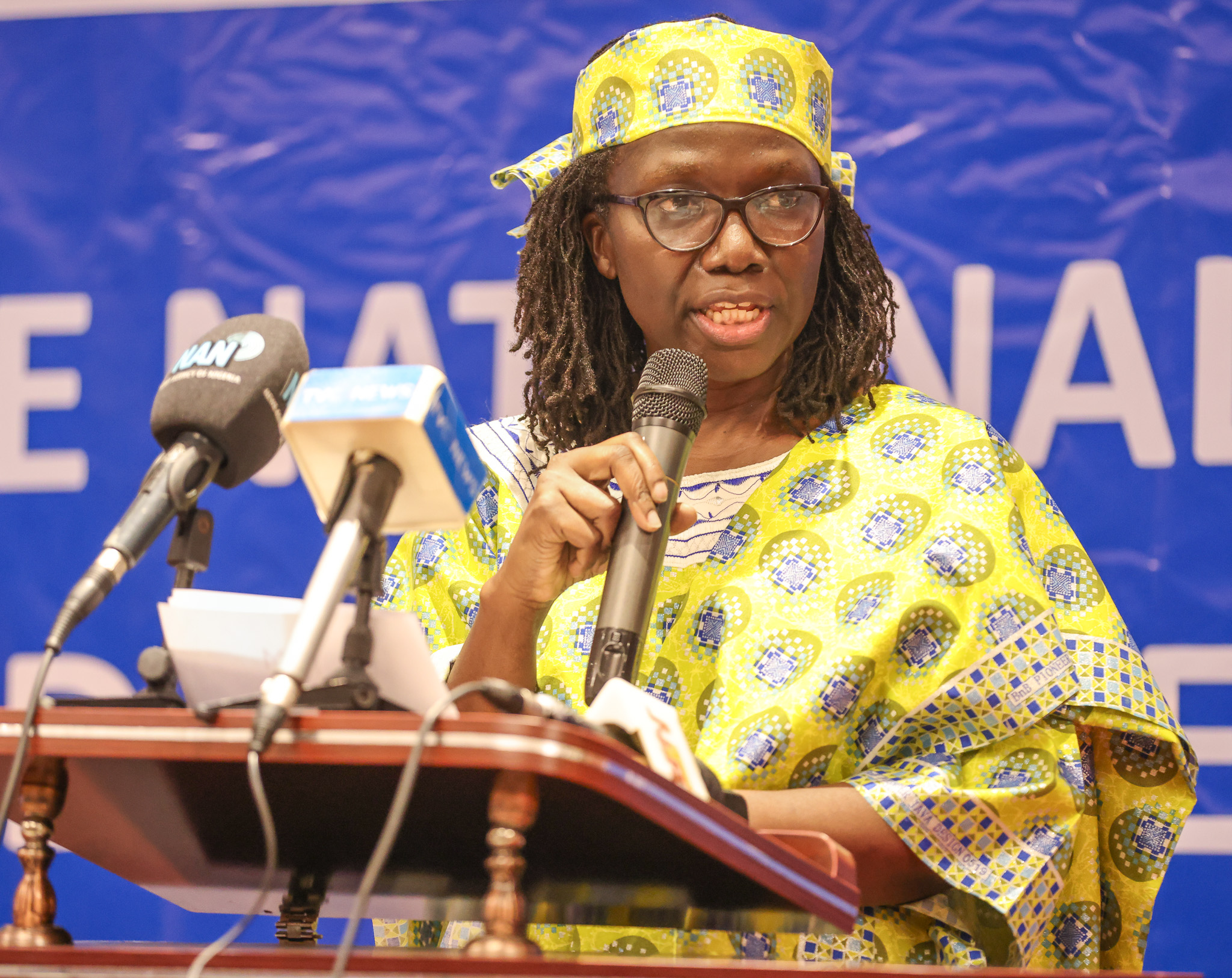News
IOM Commends Nigeria on Validation of Revised National Migration Policy

Joel Ajayi
The International Organization for Migration (IOM) has commended the Federal Government of Nigeria for its commitment to inclusive and evidence-based migration governance, following the successful validation of the Revised National Migration Policy and its Integrated Implementation Plan (IIP).
Speaking at the the meeting of the Technical Working Group on Migration and Development convened to validate the updated policy on Tuesday in Abuja., the IOM Chief of Mission in Nigeria Ms. Dimanche Sharon, expressed deep appreciation for the extensive effort behind the policy review, emphasizing that the process reflects Nigeria’s strong dedication to shaping a modern, data-driven migration system aligned with global standards.
According to her, this milestone is a testament to Nigeria’s commitment to building a migration governance system that is inclusive, grounded in evidence, and aligned with global best practices.
“Today’s gathering is not just another meeting—it’s the culmination of months of stakeholder consultations, technical research, and multi-agency collaboration.”
The IOM extended special recognition to the National Commission for Refugees, Migrants and Internally Displaced Persons (NCFRMI) for its leadership in the process, as well as to the Technical Working Group for their expertise and dedication in producing a policy document that reflects the realities of contemporary migration in Nigeria.
With a population exceeding 216 million, Nigeria is experiencing increasingly complex migration dynamics driven by economic challenges, environmental pressures, insecurity, and aspirations for social mobility.
The IOM highlighted trends such as the rise of rural-to-urban migration, climate-induced displacement, and the “Japa” phenomenon, alongside Nigeria’s growing role as both a destination and transit country in the West African migration landscape.
“These developments underscore the urgent need for comprehensive and forward-looking migration governance.
“The Revised Policy and its IIP reflect alignment with key global frameworks, including the Sustainable Development Goals (SDGs), the Global Compact for Safe, Orderly and Regular Migration (GCM), the Migration Policy Framework for Africa, and the ECOWAS Free Movement Protocol.”
She noted that the policy is grounded in data from national assessments, Migration Governance Indicators, and Nigeria’s Voluntary GCM Reviews. It addresses key migration priorities such as: The challenges of climate-induced displacement and the need for environmental sustainability;
“Strengthening migration data systems and governance;
“Harnessing the benefits of labor migration and diaspora engagement;
“Enhancing protection for vulnerable populations, including IDPs, migrants in transit, victims of trafficking, women, children, and persons with disabilities.
“This policy is not just a theoretical document—it is a call to action,” she added. “It calls for stronger collaboration among Ministries, Departments, and Agencies; a whole-of-government and whole-of-society approach; and most importantly, a migration governance system centered on the rights and needs of migrants themselves.”
The IOM reaffirmed its commitment to supporting Nigeria in the policy’s final adoption, resource mobilization, and implementation, and called on all stakeholders to champion the policy through to approval by the Federal Executive Council.
In his addressed, Minister of State for the Federal Ministry of Humanitarian Affairs and Poverty Reduction, Dr. Tanko Yusuf Sununu, emphasized the importance of a coordinated national response involving ministries, agencies, civil society groups, and development partners.
He noted that the policy aligns with global best practices and international migration frameworks, with a particular focus on mitigating the loss of skilled professionals—especially in the healthcare sector.
He said the revised policy aims to foster “brain circulation” through partnerships between Nigerian and international universities.
“More than 1.4 million Nigerians have emigrated in recent years, with 51 percent of them holding tertiary education credentials,” Sununu stated.
“Initiatives such as transnational education agreements will help retain academic and medical talent while fostering knowledge exchange.”
In his address, the Federal Commissioner of NCFRMI, Mr. Tijani Ahmed, explained that the revised 2025 National Migration Policy was developed in collaboration with development partners to address evolving migration challenges in Nigeria.
Speaking at the unveiling in Abuja, Ahmed stated that the policy seeks to balance the opportunities and risks associated with migration, ensuring Nigeria’s practices align with global standards, including the United Nations’ Global Compact for Safe, Orderly, and Regular Migration.
“This update marks a major step toward modernising Nigeria’s migration governance,” Ahmed said. “Originally adopted in 2015, the policy has now been updated to respond to emerging realities such as economic shifts, conflict-driven displacement, and human trafficking.”
The review process was led by NCFRMI and involved a 19-member Policy Review Committee comprising representatives from government, civil society, academia, and international organizations. Ahmed stressed the importance of an integrated approach that ensures the policy is both locally relevant and globally aligned.
News
Amb Lion Ogorry Files Landmark Lawsuit Against Sahara Reporters, Sowore For Misleading and Malicious Publication Endangering National Security

Ambassador Adebayo Lion Ogorry, a renowned public advocacy practitioner and activist, today announced the filing of a high-profile lawsuit against Sahara Reporters Ltd. and its publisher, Omoyele Sowore, in the High Court of the Federal Capital Territory, Abuja.
The suit, numbered FCT/HC/CV/4767/2025, accuses the defendants of publishing a false, malicious, and reckless article that violates Nigeria’s Constitution, the Cybercrimes (Prohibition, Prevention, Etc.) Act 2015, and other laws protecting public discourse, national security, and public order.
The originating summons, filed on November 24, 2025, stems from a Sahara Reporters article titled
“EXCLUSIVE: How Tinubu’s Defence Minister Matawalle Maintains Contact With Bandit Leaders, Ordered Them To Compel Communities To Vote For APC—Former Aide,” published on November 19, 2025.
Ambassador Ogorry alleges that the publication contains grave, unfounded accusations against the Honourable Minister of State for Defence, Dr. Bello Matawalle, claiming he maintains illicit contacts with bandit leaders, orders communities to vote for the All Progressives Congress (APC), and engages in activities that undermine counter-terrorism efforts.
These claims, according to the suit, are not only false but also fabricated to incite alarm, hatred, and ill-will, while endangering national security and public safety.
In his affidavit supporting the summons, Ambassador Ogorry, a Nigerian citizen and resident of Abuja with a long-standing commitment to public order and lawful civic discourse, emphasized that the article was disseminated widely across Sahara Reporters’ website, social media channels, X.com (Twitter) account, Facebook pages, WhatsApp broadcasts, and other platforms. He described the publication as a blatant violation of Section 39(3)(a) of the 1999 Constitution (as amended), which prohibits speech that endangers public safety, national security, and public order. Furthermore, it contravenes Sections 24(1)(a) & (b) of the Cybercrimes Act 2015 by disseminating false, misleading, and harmful information capable of causing alarm or ill-will.
“The defendants’ reckless actions have not only tarnished the reputation of a dedicated public servant but have also compromised ongoing military operations against banditry and terrorism in Nigeria’s North-West region,” said Ambassador Ogorry. “This publication promotes distrust, exposes the Minister to risks, and undermines the morale of our armed forces engaged in counter-terrorism. It is a direct assault on our national security and the freedom of expression that must be balanced with responsibility.”
The lawsuit seeks the following reliefs from the court:
– A declaration that the publication is false, misleading, malicious, and not protected speech under Section 39(1) of the Constitution (as amended).
– A declaration that it falls within restricted speech under Section 39(3)(a), endangering public safety, national security, and public order.
– A declaration that it violates Sections 24(1)(a) & (b) of the Cybercrimes Act 2015 by prohibiting false, harmful, or misleading information.
– AN ORDER OF INJUNCTION restraining the Defendants, their agents, or privies from further publishing, distributing, circulating, or causing to be circulated the said false publication or any other malicious publication especially as it relates to and against the person of Defence Minister, Dr. Matawalle.
– An order directing the defendants to issue a public retraction of the publication and publish a full apology on their website and social media channels for 14 consecutive days.
– General and exemplary damages of N10,000,000,000 (Ten Billion Naira) for the frivolous, false, and malicious publication geared toward endangering public safety, national security, and public order.
Ambassador Ogorry highlighted that the article, based on unverified claims from an alleged “former senior aide,” lacks any official record or evidence, demonstrating the defendants’ disregard for truth and ethical journalism. He urged the court to address this as a matter of urgent national importance, citing precedents such as President F.R.N. v. ISA (2017) and Guardian Newspapers v. AIEH (2011), which affirm that freedom of expression does not protect reckless publications that threaten security.
“This lawsuit is not just about correcting a falsehood; it’s about safeguarding Nigeria’s democracy, protecting public officials from baseless attacks, and ensuring media accountability,” Ambassador Ogorry added. “Sahara Reporters and Omoyele Sowore must be held responsible for their role in spreading dangerous misinformation that could fuel terrorism and disrupt public order.”
The case is set for hearing in the Abuja Judicial Division, and Ambassador Ogorry expressed confidence in the judiciary’s ability to uphold justice and constitutional principles.
About Ambassador Adebayo Lion Ogorry
Ambassador Adebayo Lion Ogorry is a public advocacy practitioner, activist, and Nigerian citizen dedicated to promoting national security, public order, and lawful civic discourse. With a focus on protecting public discourse from malicious interference, he advocates for responsible journalism and governance.
-

 Featured6 years ago
Featured6 years agoLampard Names New Chelsea Manager
-

 Featured6 years ago
Featured6 years agoFG To Extends Lockdown In FCT, Lagos Ogun states For 7days
-

 Featured6 years ago
Featured6 years agoChildren Custody: Court Adjourns Mike Ezuruonye, Wife’s Case To April 7
-

 Featured6 years ago
Featured6 years agoNYSC Dismisses Report Of DG’s Plan To Islamize Benue Orientation Camp
-

 Featured4 years ago
Featured4 years agoTransfer Saga: How Mikel Obi Refused to compensate me After I Linked Him Worth $4m Deal In Kuwait SC – Okafor
-
Sports3 years ago
TINUBU LAMBAST DELE MOMODU
-

 News11 months ago
News11 months agoZulu to Super Eagles B team, President Tinubu is happy with you
-
Featured6 years ago
Board urges FG to establish one-stop rehabilitation centres in 6 geopolitical zones
